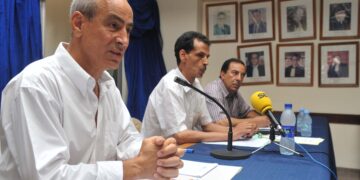U.S. Government Should Demand Independent, Impartial Investigation and Second Autopsy of Ayman Hadhoud; At Least Fifth Egyptian to Die in State Custody this Year
(Washington D.C., April 27, 2022) – Photos of Ayman Hadhoud's body that were taken after his death in state custody and obtained by Democracy for the Arab World Now (DAWN) and the New York Times strongly suggest torture or ill-treatment, as confirmed by a forensic pathologist DAWN consulted.
The international community, and in particular the United States, Egypt's main military benefactor, should demand an independent, impartial investigation of Hadhoud's death and a second autopsy to allow his family to know the truth about his disappearance and death, said DAWN.
"The Egyptian government lied to Ayman Hadhoud's family for months about abducting him, detaining him, and about his death in state custody, and without an impartial investigation conducted by international experts—including a second autopsy that allows for the presence of independent observers—there is little reason to believe that his family will ever know how Ayman died and who to hold accountable," said John Hursh, Program Director for DAWN. "Ayman Hadhoud is at least the fifth Egyptian to die in state custody this year and one of more than 1,000 Egyptians to die in a detention facility or prison since the 2013 coup that brought President Sisi to power."
On April 20, DAWN obtained several previously unpublished photos of Hadhoud's body, showing wounds, bruising, and discoloration to his face, head, and arms. The pictures are too graphic for DAWN to publish. DAWN verified that these photos were taken at the hospital morgue on April 12, after which Hadhoud's family removed his body. DAWN shared these photos with a forensic pathologist who confirmed that Ayman's face and forearms contain marks that natural processes do not explain and instead represent injuries inflicted on him. Amnesty International first reported on the strong likelihood that Hadhoud was tortured before his death, using a separate set of leaked photos assessed by forensic pathologist Derrick Pounder.
DAWN's new research provides additional evidence that challenges the Egyptian government's claim that Hadhoud died "without suspicion" on March 5. As reported by Amnesty, the marks on Hadhoud's body, and their distribution on his forearms and face, strongly suggest "repeated systematic infliction," meaning torture or ill-treatment, while Hadhoud was still alive.
Ayman Hadhoud was a respected economic researcher and co-founder of the Reform and Development Party, which is now led by Mohamed Anwar Sadat. Egyptian officials forcibly disappeared Hadhoud on February 5, but repeatedly denied holding him when the family made official requests regarding his whereabouts. According to the Egyptian government, Hadhoud died at Abbasiya Mental Health Hospital on March 5, but Egyptian officials did not inform the family of Ayman's death until April 9, more than a month after he died, raising questions as to the circumstances of his death.
Following Hadhoud's death, Egyptian officials gave contradictory explanations for his disappearance. On April 10, the Ministry of Interior published a statement claiming that Hadhoud tried to break into an apartment in the Zamalek neighborhood in Cairo on February 6 and that officials placed him in Abbasiya Hospital as a result. They denied that he was forcibly disappeared. This claim differs from hospital records that reportedly show Ayman tried to steal a car in Senbellawein outside of Cairo and about 100 km from where he lived. Both accounts contradict the Public Prosecutor's claim that it had no record of Ayman's detainment when approached repeatedly by the family in February and March.
The Public Prosecutor initially claimed that Hadhoud died from a sudden drop in blood pressure that caused cardiac arrest, and on April 12, the government conducted an autopsy. The examining doctor, however, refused to allow independent observers. The same day, the Prosecutor issued a statement where it claimed that there was no reason to suspect "criminal suspicion" in Hadhoud's death. Ayman's family saw his body before the autopsy and were not convinced. The Prosecutor also summoned and then questioned Ayman's brother Omar, who had already expressed fear of being detained for speaking to the media over Ayman's case.
On April 18, the Public Prosecutor issued a statement on its Facebook page claiming that the autopsy showed that there were no signs of torture or ill-treatment on Hadhoud's body, and that his death was attributable to a chronic heart condition. In contrast, Hadhoud family lawyer Fatima Siraj noted that Ayman had no history of heart disease. Prosecutors also refused to provide the family with a copy of the autopsy report, and the statement did not address the more than monthlong delay in Hadhoud's death and the notification to his family or why officials mislabeled Ayman's body as unidentified and scheduled its burial in the charity cemetery even though his identity was known.
Egyptian officials still refuse to share the autopsy report with Hadhoud's family or their lawyers. DAWN researchers did learn that officials allowed Siraj to see parts of the forensic report on April 23 or 24, but not the entire report, which includes the autopsy, autopsy examination results, blood samples, and echocardiogram reports.
"Egyptian officials completed this autopsy without the presence of Ayman's family, lawyers, or independent observers, which raises obvious questions of credibility since the government has already lied to the family for months," said Hursh. "It is imperative that an independent committee of international forensic pathologists conduct a second autopsy examination free of government interference and in accordance with the international standards set forth in the UN Minnesota Protocol on the Investigation of Potentially Unlawful Death."
On April 24, the Association for Freedom of Thought and Expression and the Egyptian Initiative for Personal Rights, acting on behalf of Ayman's brother Omar, submitted a request to the Nasr City Prosecutor to file a civil claim against the administration of Abbasiya Mental Health Hospital. The Public Prosecutor's Office accepted this submission the same day meaning the family could collect damages for Ayman's death should they bring a successful claim.
Hadhoud's disappearance and detainment fits a familiar pattern in Egypt, where an initial disappearance is followed by misinformation and lies. In this case, officials first denied detaining Hadhoud, and then even after admitting that he was being held at Abbasiya Hospital, the Public Prosecutor's Office and hospital officials refused to allow family or friends to visit, denying at least 15 requests. Hadhoud's case also demonstrates just how little it takes for Egyptians to be disappeared and detained under Sisi's increasingly authoritarian rule. Hadhoud was not an overtly political person, but an economic researcher concerned with climate change and the well being of Egypt's economy.
But as Egypt's economy continues to worsen and prices for basic goods continue to rise, even economic analysis and expressing dissatisfaction over the country's financial struggles has become a redline for Sisi's government. On April 21, security officials arrested three Egyptians for their satirical TikTok videos, making light of rising prices in Egypt. After their arrest, the Supreme State Security Prosecution (SSSP) charged the three with spreading false news and ordered their detention.
This follows the prosecution of Abdel Rahman Saeed, a Telecom Egypt employee, who criticized inflation and rising food prices on his Facebook account. Like Hadhoud, Saeed is not politically active, but six Egyptian security agents nonetheless abducted Saeed from his home on March 23. In the following weeks, the Egyptian government ignored several requests from Saeed's family to disclose his location. Security officials also refused to follow a prosecutor's order to release Saeed, before he appeared before a court on April 20 facing different charges. To date, Egyptian officials have not allowed Saeed's attorney to meet with him.
Human rights organizations have documented systematic torture of detainees in Egyptian security facilities, police stations, and prisons, and noted the frequent use of torture in instances of enforced disappearances, such as Hadhoud's. Since Sisi came to power through a military coup in 2013, more than 1,000 detainees and prisoners have died within Egyptian detention facilities or prisons. This total includes at least nine minors and four people before Hadhoud already this year.




































